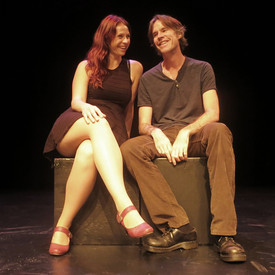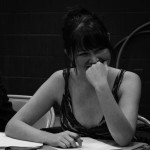A single light shines on a brooding man. Empty space feeds emptiness. Moonlight After Midnight, written and performed by Martin Dockery and Vanessa Quesnelle, appears as an exploration of a classic love story at first; but it quickly, miraculously, transforms into a journey of love, memory, and loss.
Quoted as an “emotional kaleidoscope” by the Winnipeg Free Press, Moonlight After Midnight is indeed gorgeous, consuming, and saturated with feeling. The play begins with a light shining on Dockery, staring into the distance. The space is stark; only a chair and table to set the scene. Quesnelle slowly, seductively, enters the room singing with a twinge of melancholy: a tone that sets the rest of the play. Within the first few minutes, we learn that Dockery may or may not have requested a female be sent to his hotel room: one who can role play, and eventually, roll with the punches. Thus begins a structure of role playing, as the characters pretend to be other people in other places and times, each scene separated by dimmed lights and Quesnelle’s soulful songs.
Known simply to each other as Man In the Room and Girl At A Wedding, Dockery and Quesnelle role play scenes within scenes, making the audience become more engaged mentally and emotionally with these characters as their scenes evolve into each other. Memory, dreams, and reality merge together. The energy between Quesnelle and Dockery is tangible, kinetic. While Dockery is frenzied and frantic, jumping from thought to thought, Quesnelle balances his character with sultry, soft, and rational charm. As the play progresses, we learn bits and pieces of love, hope, and loss. Brilliantly written, with one scene morphing into another as Dockery and Quesnelle delve into different memories, times, and feelings, we develop a bond with the characters that only strengthens as their stories change and develop, linked only by a comet in the sky. Hilarious at times, ironic, and nostalgic at others, this play creates art through movement, speech, and silence.
Throughout the play, the setting never changes, but reality and dream become increasingly intertwined. To understand the complexity and depth these characters create, the audience has to be completely engaged; and that’s the kind of art that changes you.
Though the show is no longer playing in New York City, where it showed as part of the Frigid Festival, however, if you find your way to Orlando, Florida, go see the show and prepare to be transported into another world, another dream, and another memory. You won’t regret it.
Twisted Talk: What was the last play you saw in New York City? What’s your favorite? Discuss below!









